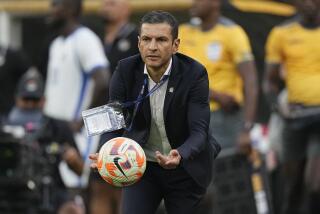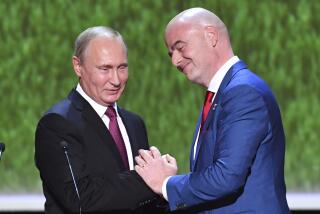Injuries, controversies have soccer coaches on edge
- Share via
Cast aside the rose-colored glasses and there are only six European teams that have a legitimate chance of winning the World Cup in South Africa this year — England, France, Germany, Italy, the Netherlands and Spain.
With that in mind, every injury that occurs and every controversy that erupts between now and the June 11 tournament opener in Johannesburg is magnified tenfold.
The closer the World Cup gets, the more frayed the coaches’ nerves become.
That applies just as much to club coaches as to national team coaches, especially with the club coaches having to pursue league and continental championships while at the same time not risking the health of World Cup-bound players.
Take Manchester United, for example. On Tuesday, Coach Alex Ferguson’s team lost talismanic England striker Wayne Rooney to an injury during a European Champions League loss to Bayern Munich in Germany.
On Saturday, with Rooney on crutches and reduced to the role of spectator, United was beaten, 2-1, at Old Trafford by Chelsea, which leapfrogged Manchester into first place in the English Premier League, two points ahead with five games to play.
Rooney also will miss the second leg of the Champions League quarterfinal series against Bayern on Wednesday, so it was no small wonder that Ferguson erupted Saturday. His dream of winning a record fourth consecutive English title and a record 19th overall is suddenly in jeopardy.
Referee Mike Dean and his assistants took the brunt of Ferguson’s wrath, especially for not spotting the fact that Ivory Coast World Cup striker Didier Drogba’s game-winning goal for Chelsea was scored from a blatantly offside position.
“What I can’t understand is the linesman’s directly in front of it,” Ferguson told Britain’s Sky Sports 1. “He has no one near him and gets it wrong. A game of that magnitude, you really need quality officials and we didn’t get them today. It was a poor, poor performance.”
French feud
Across the English Channel, France Coach Raymond Domenech — not the most stable of characters at the best of times — was incensed that Arsenal’s French coach, Arsene Wenger, had taken a gamble with one of his players only to see it backfire badly.
Wenger opted to start French national team defender William Gallas in the Gunners’ Champions League quarterfinal first-leg game against defending champion Barcelona in London on Wednesday.
Gallas had been sidelined for six weeks with a calf injury, and the game marked his return. He immediately aggravated the calf injury and could be out for an additional five weeks.
“I’m livid,” Domenech said. “It’s outrageous and irresponsible to have played him so early after the injury. It’s scandalous. He had better be fit for the World Cup.”
Wenger was quick to defend his decision.
“Gallas was born in 1977,” he said. “He’s 32, so you ask a player of that experience: ‘Do you feel ready to play? Have you worked hard enough? Do you feel ready to go into this game?’ When they say yes, you have to believe them.
“We have to first take care of the interests of Arsenal. The French national team is important, but Arsenal is as well and he is paid by the club, not the French national team. We have to use the players when they declare themselves fit.”
German dilemma
In Gelsenkirchen, Germany, there is no question about the fitness of Brazilian-born striker Kevin Kuryani. On Saturday, the 28-year-old scored his Bundesliga-leading 18th goal of the season for Schalke 04 in a 2-1 home loss to Bayern Munich that vaulted Bayern over Schalke and into first place.
But controversy rages over whether Kuryani should be recalled to Germany’s national team after he was banned by Coach Joachim Low. Kuryani walked out on the team in anger at not being selected to play in a World Cup qualifier against Russia in Dortmund in October 2008 and has not played for it since.
Various German heavyweights have weighed in with their opinions, not least of all former German World Cup winning player and coach Franz Beckenbauer.
“Should the top goal-scorer in the Bundesliga go to South Africa? In my opinion, yes,” Beckenbauer said in his weekly column in the German newspaper Bild, supporting Low in his initial decision but regretting its severity.
“The ‘life’ punishment always seemed excessive,” Beckenbauer said, “and now it is a problem for the national team.
“Miroslav Klose and Lukas Podolski are a long way from World Cup form, while Stefan Kiessling and Mario Gomez need to get match fit after injuries. In this situation, to ignore the top scorer is wrong in my eyes.
“If Joachim Low does a U-turn, he deserves respect, not criticism. One must always remember that the national team is not a matter of a few people who have a problem with each other. It belongs to us all.”
Short passes
Now that temperamental forward Mario Balotelli has kissed and made up with Inter Milan Coach Jose Mourinho, it will be interesting to see if he can work his way onto the World Cup roster of Italy Coach Marcello Lippi, who gave him his backing in mid-March. “I am sure — certain, even — that when he matures he could carry on the good work he is doing for Inter into the Italy squad,” Lippi said. ... On paper, Spain might have two of the most dangerous attacking players at the World Cup in the Barcelona teammates Xavi and Andres Iniesta, but the Netherlands could be just as good, if not better, with the duo of Wesley Sneijder and Arjen Robben. ... The broken right fibula suffered by Arsenal’s Cesc Fabregas in his team’s 2-2 Champions League quarterfinal tie with Barcelona means he will be out for six weeks and could struggle to make Spain’s World Cup squad. Spain Coach Vicente Del Bosque will name his 23-man roster before final warmup matches against Liechtenstein, South Korea and Poland in early June.







